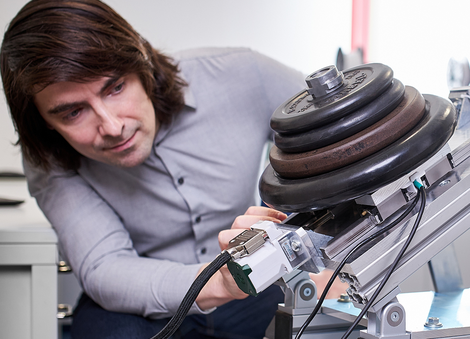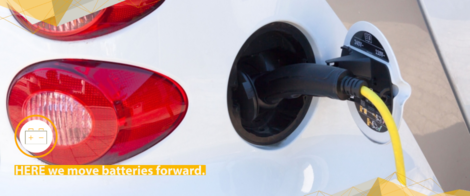The Size of a Small Fist
An efficient electric drive has been developed in Magdeburg

In only a short period, the start-up SMELA from Saxony-Anhalt has received several awards for the electromechanical linear actuators it has developed. The systems are compact, energy-saving and robust and could soon replace conventional pneumatic drives.
The achievements of SMELA from Magdeburg, which began life four years ago as a start-up project and has been a registered company for six months, are highly impressive: second place in the prestigious list of Germany’s top 50 start-ups 2020; second place in the Science4Life business plan competition; the IQ Innovation Award for Magdeburg in 2020; second place in the start2grow start-up competition in 2020 and third place in the Hugo Junkers prize 2019. The list goes on, but these examples are enough to illustrate the importance of the innovative products developed by this small company.
Compressed air systems are not ideal
SMELA stands for “smart electric actuators,” which are drive components for automated linear processes. Compressed air systems are currently used for linear movements in many production processes, for example in the packaging industry and in the manufacture of many everyday products from toothbrushes to smartphones. In these systems a flow of compressed air moves a piston to and fro in a cylinder to produce linear movements. One disadvantage is their high energy consumption. “Only five percent of the energy used actually makes the components move,” says SMELA co-founder and CEO Benjamin Horn. He also explains that because of the frequent leaks, the systems require a lot of maintenance. Electric alternatives that could replace the compressed air systems are already available. “But they are too big. At the moment they are five to seven times the size of our drive.” Also most electromechanical drives rely on the use of very expensive mechanical components to reduce wear. However, these high additional costs cannot be justified for every application. This means that the conventional drives are not an ideal solution.
Electric drives
This is where SMELA comes in. The telescopic electromechanical linear actuators developed by the start-up use 75 percent less energy, which is their first advantage. The second is the convenience of their flexible movements. As Benjamin Horn explains: “The compressed air systems generally allow for only one defined position. With our drives, positioning at different points is possible and these points can also be approached at different speeds. This means that flexible production processes can be used to manufacture different products in one machine.” The third advantage is that the gentle movement of the drive to its end position reduces material fatigue and the noise levels of the machine. “Of course, there is wear in our systems. But it is automatically monitored and this means that we can accurately predict when a replacement part or a refurbishment will be required,” says Benjamin Horn. This is known as predictive maintenance, which is only carried out when actually needed and allows spare parts to be kept in stock in advance.
However, the biggest advantage is the much smaller size of the actuators. Their dimensions generally depend on the stroke, which is the distance traveled by the ram. SMELA drives with a stroke of five centimeters are roughly the size of a small fist. They are regulated by motion controllers which are activated independently (locally) or via a main control unit (centrally). These compact systems, which have no air hoses and no compressors, can be used anywhere where space is limited.
Saxony-Anhalt remains a business location
SMELA actuators are currently being manufactured in small production runs and used in pilot projects. Suppliers produce the individual components and they are assembled by SMELA. The company is receiving more and more enquiries. The idea of the compact drive aroused a great deal of interest three years ago when it was exhibited at the Hannover Messe. The application for the patent was filed in 2017 and it is currently undergoing international investigation. All of this means that the SMELA founders, Benjamin Horn, Denis Draganov and Oleksandr Tyshakin, do not need to worry about the future. By the end of the year, the company plans to employ ten people and it moved into new premises just a few weeks ago. SMELA’s portfolio is gradually growing. Different sizes and applications of the product have been developed and there are also several ideas for “by-products” on the table, according to Benjamin Horn. “It definitely won’t be boring around here.”
Thanks to a private investor, the start-up can now focus on its market entry and its first real growth phase over the next two years. It has also been awarded funding by the state of Saxony-Anhalt, by Univations GmbH, a start-up center from Halle, by the Transfer and Entrepreneur Center (TUGZ) at Otto von Guericke University Magdeburg and by the university’s chair of electric drive systems. Benjamin Horn explains that SMELA has been able to use the laboratories and incubators at the university, which has been very helpful.
The company has definitely decided to stay in Magdeburg. The city is not only its home, but also has strong links with the research community, experts in the field and highly motivated students via the university. Although many of SMELA’s suppliers and customers are in the south, moving there was never an option. “We deliberately chose Magdeburg. It gives us just as many opportunities to grow and develop and in many cases decisions can be made more quickly here.
Author: Anja Falgowski/IMG Saxony-Anhalt

In electromobility, the battery is of central importance as an energy storage device.
Saxony-Anhalt is ideally positioned as a location for battery cell production in Germany - from battery chemicals and material production to battery development and testing.
>> Find out more about battery cell manufacturing in Saxony-Anhalt
